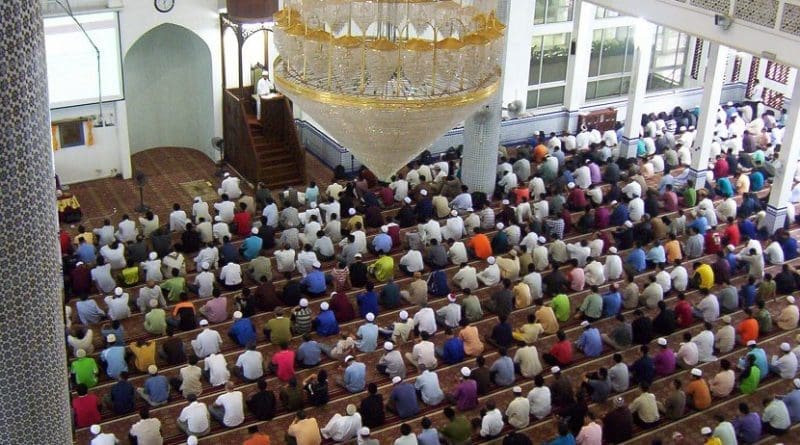The Politicization Of Syariah Law In Muhyiddin’s Malaysia – Analysis
By Ahmad Fauzi Abdul Hamid*
In March 2021, Malaysia’s Perikatan Nasional (PN) government proposed resurrecting the Syariah Courts (Criminal Jurisdiction) Bill 355 (RUU355). Reviving it would allow state-level Syariah courts to mete out heavier penalties against Muslim offenders of legislation under the State List of the Ninth Schedule of the Federal Constitution.
This could pave the way for the prescription of hudud laws as instituted by the Quran and the Prophetic traditions. Criminal punishments for Syariah offences in Malaysia currently cannot exceed three years imprisonment, six strokes of the cane and a RM5000 (US$1219) fine.
In 2016–17, the then Barisan Nasional (BN) government allowed the Pan-Malaysian Islamic Party (PAS) to table RUU355 in parliament, though it never reached the stage of being debated. PAS and the United Malays National Organisation (UMNO) — BN’s main constituent party — have since cemented relations through the Muafakat Nasional (MN) coalition in September 2019. In his five-year roadmap to empower Syariah law, Ahmad Marzuk, Deputy Minister in the Prime Minister’s Department in charge of Religious Affairs, declared that RUU355 will be resurrected along with 11 other bills — one of which appears to seek to control and restrict the propagation of non-Muslim religions.
The proposed bills are in line with the PN administration’s express commitment to defend Malay–Muslim rights and Islam in the wake of a widespread ethno-religious nativist reaction against the previous Pakatan Harapan (PH) government of May 2018–February 2020. Yet the convergence of religious motives and political expediency in reviving RUU355 is clear.
With PN in government for over a year now, PAS is under pressure to realise its age-old rhetoric of raising the status of Islamic law to be at least on par with civil law in Malaysia. The key phrase that PAS trumpets, ‘harmonising civil and Syariah law’, is reminiscent of slogans frequently thrown around by the UMNO-led BN government during the decades of its Islamisation policy.
The PN government has always been fragile and at risk of losing its razor-thin parliamentary majority, mustered from a hodgepodge of parties and interests united by an anti-PH stance. But a crumbling of Prime Minister Muhyiddin Yassin’s unstable government has been looking increasingly likely in recent months with the open withdrawal of support from a handful of UMNO politicians. This culminated in a severing of relations between UMNO and Muhyiddin’s Malaysian United Indigenous Party (BERSATU) during a recent UMNO General Assembly. It prompted PAS President Hadi Awang to issue an unequivocal statement preferring PN over MN, or BERSATU over UMNO, at least for the time being.
But the incredibly protean atmosphere of contemporary Malaysian politics may still witness a change should the PN government lose its majority, or if parliament re-convenes in August and PAS’s advantage of allying with BERSATU wanes.
Rallying conservative Malay–Muslim support could be accomplished by actualising Islamic law in any form. UMNO is doing the same, having declared its express intention to strengthen the implementation of Syariah should it be given a two-thirds majority in the next general election (GE15).
The PN government’s inability to influence civil court judgments, while good in propping up its image as a government that maintains the independence of the judiciary, has left its Islamist conservative support base railing against judicial decisions that seemingly disfavour Islam. Two court cases in particular left many conservative Muslims embittered at the apparent incapacity of the Syariah law infrastructure to counter decisions that effectively emasculates it in the eyes of many.
First, the Federal Court declared Section 28 of the Syariah Criminal Offences (Selangor) Enactment 1995 unconstitutional because the offence of ‘unnatural sex’, punishable under state-level Syariah laws, was already regulated under Parliament. Second, the Kuala Lumpur High Court’s pronouncement that the word ‘Allah’ could be legally used by Christians to refer to God upset many conservative Muslims because it removed the exclusive right of Muslims. UMNO — already estranged from BERSATU by mid-March — was quick to pounce on the issue by announcing its preparedness to demonstrate on the streets in a show of protest against the alleged usurpation of Muslims’ exclusive religious speech rights.
Being a committed member of the PN coalition whose peaceful coup against PH had always been justified in the name of Islam, PAS had to act in a more civil manner than when it was in opposition. Hadi reasserted PAS’s stance that non-Muslims are permitted to use the word ‘Allah’ under strict conditions and Ahmad Marzuk also justified the bill to control and restrict the propagation of non-Muslim religions based on the High Court verdict.
PAS’s calculative approach won plaudits from its non-Muslim coalition partners. This is an encouraging sign as it continues to test waters over whether to side with a BERSATU-led or an UMNO-led coalition with GE15 looming.
*About the author: Ahmad Fauzi Abdul Hamid is Professor of Political Science in the School of Distance Education at Universiti Sains Malaysia and a Scholar-in-Residence at the Oxford Centre for Islamic Studies.
Source: This article was published by East Asia Forum

